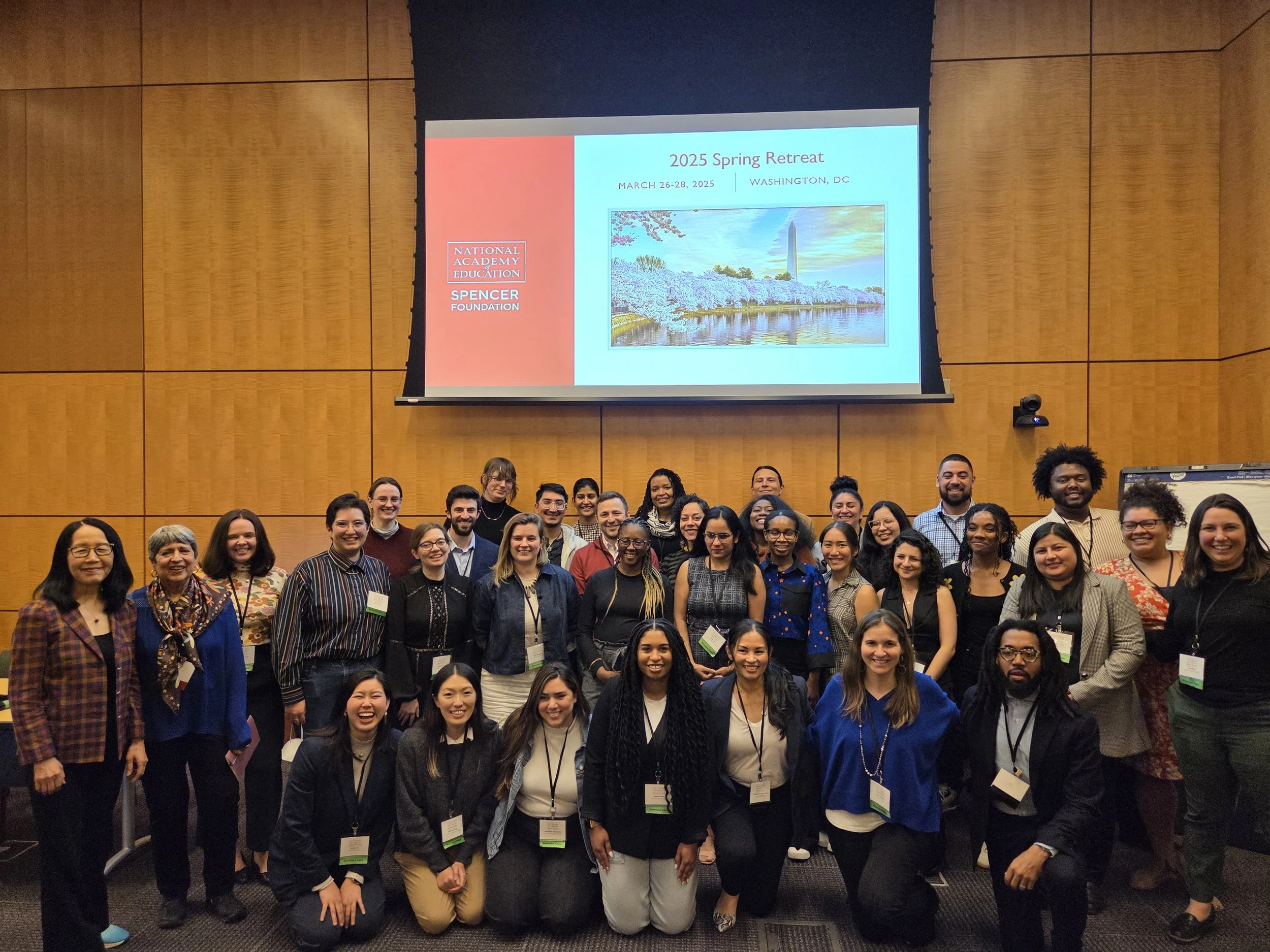National Academy of Education/Spencer Foundation Dissertation Fellowship Reflections
About two weeks ago, I traveled to Washington D.C. for the 2025 National Academy of Education/Spencer Foundation Spring Retreat. As a 2024 dissertation fellow, I presented some key findings from my research to NaEd members, postdoc fellows, and other dissertation scholars. Overall, the experience was positive, and I am deeply grateful for this opportunity. These are a few of my personal reflections from the spring retreat.
Even with meditation, deep breathing exercises, and extra rest, my body was on edge in D.C. under this current administration. I already felt weird being in the National Academy of Sciences building in the fall, and being there in the midst of attacks on People of Color, immigrants, and working-class citizens made it even worse. I don’t think any of the fellows felt particularly enthused about D.C. in 2025; however, I do appreciate the willingness of the retreat’s planning committee to open with a panel discussion on the future of education and schooling in the wake of federal cuts to higher education and the Department of Education and far-right, evangelical Christian attacks on curriculum and pedagogy. I will say, unlike the discussion on doing research that matters in times of crisis, the spring panel lacked Indigenous scholarly perspectives that I think would’ve helped us move toward future visioning with wellbeing in mind. On that note, if I am correct, I am the first Native Hawaiian dissertation fellow. Moreover, I believe I was the only Pacific Islander scholar at this retreat. In thinking about the global nature of these intersectional crises, we must look to Indigenous communities who are disproportionately impacted by climate change. Being first in this academic space was never a goal of mine because of the immense responsibility that comes with it, but my biggest critique of NaEd and the dissertation fellowship is that they lack recognition of Pacific Islander scholars. I care less about being first and more about ensuring I am not the last. This is just one of many ways in which NaEd/Spencer can and should do better.
The dissertation fellow presentations were fire. Absolutely amazing. I learned so much from my colleagues on Indigenous community-based design, youth responses to sociopolitical and environmental crises, teacher education programs at minority-serving institutions, and anti-colonial approaches to math and science. Additionally, the design of the program was incredibly thoughtful. In the fall, the second-year postdoctoral scholars present for the dissertation and first-year postdoctoral fellows. In the spring, the dissertation fellows present, and the first-year postdoctoral fellows serve as discussants. In essence, there is a mix of teaching and learning among the three cohorts that meet in the fall and spring, and I appreciate the intentionality of connecting dissertation fellows with postdoctoral scholars who are knowledgeable in our content area. Shout out to my dissertation chair Daniel Solórzano and my faculty mentor Emma Elliott for making the trek out to D.C. and supporting my work as well as my wonderful discussant Rachel Talbert and friend Forrest Bruce for an empowering conversation about futures in Indigenous education. I learned so much from all of you.
Scarcity mindsets are abundant in academia, and it continues to reinforce neoliberal narratives about academic competition for limited positions and salaries. Furthermore, despite the increased diversity in dissertation and postdoctoral fellow cohorts, it wasn’t too long ago that the space was more homogeneous. While I expect cohorts to continue to be highly competitive and diverse, I think it’s also important to remember that NaEd membership continues to lack international, non-white scholars. Again, NaEd can and should do better.
We can be in academia and lead with love and humor. I attended a wonderful presentation by Dr. J.D. Lopez and Dr. Yolanda Sealey-Ruiz, and it reminded me that Academics of Color can bring their full selves to their work. I know there will continue to be pressure to “publish or perish” in top research universities, but I also know there are ways to ensure you “do” academia on your own terms. Personally, community and family are so important to me, and I am committing to leaning into a full range of human emotions to ensure I do not lose the part of me that is passionate about storytelling and writing for my people.
2024 NaEd/Spencer Dissertation Fellows & Planning Committee Members
